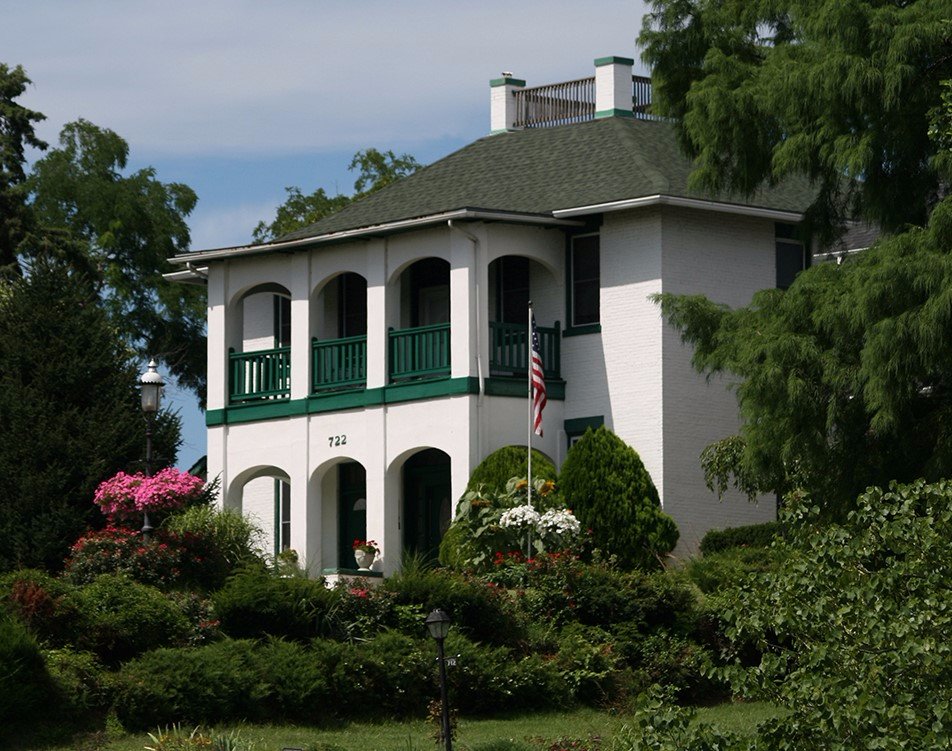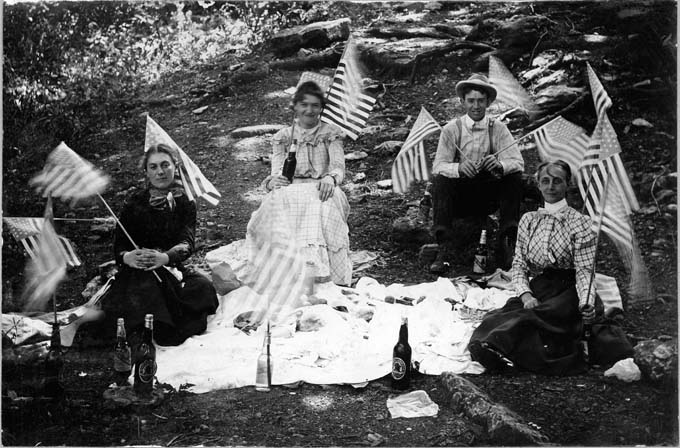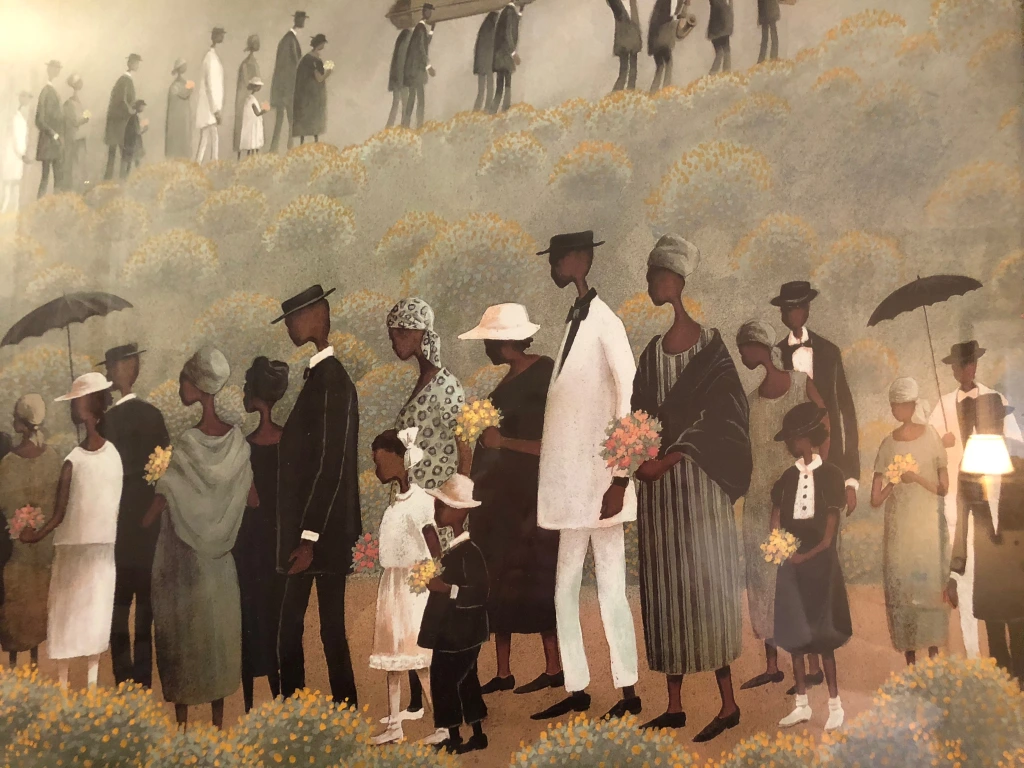Arnold Krekel’s brother Nicholas recalled the journey “In the fall of the year 1832 we sailed from Bremen. It took about three months, we landed at New York, went up the Hudson River to Albany, and from Albany to Erie by canal. Intending to go to Cleveland Ohio from there and to Missouri. On arriving at Erie, there was so much ice in the lake that we could not make the trip, so we went overland to Pittsburgh Pennsylvania, a distance of 160 miles. Mother, my sister Katherine (11 years), myself (Nicholas Krekel) rode in the wagon. Father, my three oldest brothers, Godfred [sic], Arnold and Frank walked. On this overland trip my mother took cold which continued to get worse when coming down the Ohio River, so we landed at Louisville, Kentucky to get medical assistance and religious consolation. She died there on December 14, 1832 and was also buried there. Three years later Arnold went there to find his mother’s grave but the city had been built beyond it. The voyage across the Ocean took 9 weeks, the overland trip from Erie to Pittsburgh took about 3 weeks. After her burial we continued our way to St. Louis. On arriving there we put up at the William Tell house on Main Street, a two-story stone building.”
Germany

Arnold Krekel was born in the small village of Berghausen, by Langenfeld in the Rhineland “near Cologne on the Rhine” and was seventeen years old when he made the journey. Born on March 12, 1815 to Franz Leonard Krekel (1783-1862) and Maria Catherine Schumacher (1779-1832), he was their second son in a family with nine children. His family would settle in the far southwestern tip of St. Charles County near Dutzow, a small German village in Warren County, where Gottfried Duden had lived. Duden was a friend of Arnold’s father and had authored A Report on a Journey to the Western States of North America in 1829, inspiring thousands of Germans to immigrate to the U.S.
Missouri
There his father purchased U.S. Congress land from the government, and purchased a house built by a previous squatter. While his oldest brother Gottfried, a farmer, purchased adjoining land, Arnold was turning eighteen and would strike out in new directions and make changes in the world. He would first attend the St. Charles College in the old city of St. Charles, fifty miles away, where he would meet the Americans. This was a school filled with the “old families” wealthy with property and slaves. There his connections with society began, as he studied law. Familiar with the process of surveying, he also grew his network of those actively involved in the growing city.
His religious views took him in another direction as well, as a member and one of the original 36 members of the Friends of Religious Enlightenment in 1838. The 29-year-old man was a member of the Association of Rational Christians, or Frei Denkers (Free Thinkers) in 1845 when Friedrich Muench performed his marriage to 28-year-old German born Ida Krug. Her father, was a wealthy physician in the Dutzow community, who had come with the huge Giessen Emigration Society back in 1834. They began married life in St. Charles where Arnold had already taken an active role. He had been elected a Justice of the Peace in 1841, and as a surveyor, and lawyer, he was involved in property deals all over the area. After his friend William Eckert died in 1845, former Secretary of State William Pettus had hired him to survey Eckart’s land. Eckert was the son-in-law of Francis Smith, whose estate Krekel would purchase 320 acres of land from ten years later.

Arnold’s law career began in St. Charles after being admitted to the Bar in 1845. As the City’s attorney and prosecuting attorney this brought him into close connection with the City’s rapidly expanding and prominent population. In 1852, Krekel is a rising star, as he wins the race for a seat in Missouri’s House of Representatives, the first German to be elected to Missouri’s House. He had run a campaign using his newly created newspaper, Der Demokrat, which was the first German newspaper in St. Charles County. While Krekel’s business associates were wide, he was still very proud of his German heritage and his closest friends, like Friedrich Muench and Emil Pretorius were examples. In 1853, he attended the North Missouri Railroad Convention in St. Charles, where St. Louis businessman and philanthropist John O’Fallon was also in attendance. On August 6, 1856, he surveyed and laid out a plat of a town on the 320 acres he had purchased from Smith, calling it “O’Fallon” hoping that the North Missouri Railroad would create a station. The need for wood and water at certain distances were necessary for the engines. And the U.S. Postal Service had announced that station stops would also be the locations for Post Offices.
Arnold established his younger brother, Nicholas, as the first resident of this new town of O’Fallon, with a house and property of his own. Nicholas served as the town’s founder, Postmaster and the Station Agent for the railroad all the while running his own mercantile. Nicholas would later oversee the Public sale of the lots in O’Fallon, on July 22, 1870. It was the intention of Nicholas and his wife Wilhemina (nee Moritz) to see the Catholic Church established in O’Fallon. Arnold was busy elsewhere as he had been nominated for the office of Missouri’s Attorney General in 1856.
Slavery
As the state headed for the crisis over slavery, Krekel the abolitionist was a radical voice and leader among the Germans. The U.S. Slave Schedule shows him to have one thirty-year old male mulatto living in the household in 1860, but he was not alone in this regard, as there were several German families in St. Louis, St. Charles, Warren and Franklin Counties that also owned or rented their servants as well. Most were of the belief, that until the practice of slavery was abolished, they could provide a much better living environment for the African-Americans than they would encounter in the south. He attended the Republican National Convention in May of 1860 with his friend Muench, where Germans were the only foreign born were in attendance. This gave the nomination to Abraham Lincoln for President. Up until that time, Krekel like many other German immigrants, were Benton Democrats in their politics, but the parties had shifted with the issues of immigration and slavery. In 1861, Krekel was appointed Provost Marshall for St. Charles, Warren and Lincoln counties. Provost Marshalls were established only where the local government was either failing to or refusing to meet the needs of the local citizens. Things were in turmoil and one of the most striking acts was when members of the Board of Directors of the same college where Arnold had been a student, and studied law, the St. Charles College, refused to take an Oath of Allegiance. Krekel threw out the entire board and turned the school into a hospital – for Union Troops in December of 1862.
Krekel was serving as a Colonel in the Enrolled Military Militia. His troops’ career is storied with unfortunate events that are best explained in the annals of a war that rocked the country. His Home Guards, was where his involvement brought Germans into action at the Camp Jackson affair in April of 1861. The Union soldiers managed to secure the Arsenal and rifles that could have fallen into southern hands. His troops were next called into action as Federal troops in July 1861, and while away in maneuvers in western Missouri, Krekel’s troops were accused of marauding Confederate sympathizers’ homes. Back in St. Charles County, his troops were placed in charge of guarding the crucial Peruque Creek bridge, just west of O’Fallon, which enabled vital rail transport.

Arnold’s younger brother Nicholas, who had served in the Mexican War, was a Captain in the Home Guards, back in O’Fallon.
In 1862, Arnold served as Vice President of the State’s Radical Emancipation Convention. Lincoln’s Emancipation Proclamation on January 1, 1863 did not cover Missouri because it was a “slave state” and one of three that did not secede from the Union.
When the Civil War began, Missouri’s plans for gradual emancipation infuriated the Radical Republicans, who wanted slavery abolished immediately. They took their grievances to Lincoln, who refused to take sides in Missouri’s politics, which infuriated them even more. Provisional Governor Gamble offered to resign, but the First Constitutional Convention would not accept it. Gamble died in office on 31 January 1864. Missouri’s radicals arranged for elections and for a new Constitutional Convention in November 1864, where they elected Thomas C. Fletcher Missouri governor.
Constitutional Convention of 1864
Arnold Krekel, a Democrat, was elected President of the new Constitutional Convention that convened in the Mercantile Library in St. Louis on January 6, 1865. On January 11, 1865 the convention, by a 60 to 4 vote, abolished slavery in the state with no compensation for slave owners. A month later the convention also adopted the 13th Amendment to the United States Constitution to abolish slavery throughout the U.S..
On March 31, 1865, shortly before his assassination President Lincoln appointed Arnold Krekel as Federal Judge for the Western District of Missouri. On September 17, 1866, Arnold who was long a proponent for public education, would help establish Lincoln University, Missouri’s first African-American college. For more than ten years, Krekel and his family lived in Jefferson City where he would lecture at the University for free. He was a member of the Board of Directors, and elected President of the Board in 1883. From 1872 until 1887, he also taught at the newly established School of Law at the University of Missouri, in nearby Columbia. He served as a Federal Judge for 23 years, and only retire when his health began to fail.
The family would continue to live in Jefferson City for many years. There his wife Ida, mother of his six children, Laura, Alfred, Franklin, Hilma, Alma and Walter, passed away in 1870. They had lost two sons as young children, Walter when he was two, and Franklin at age 6. By 1880 he had gone to live with his oldest daughter, Laura, who had married Louis Schmidt, still in Jefferson City. In November, Arnold at age 65, remarried to Mattie Perry of Kansas City. Early in 1888 Krekel resigned his Judgeship because of illness, and he and his wife had moved to Kansas City. In July of 1888, Arnold Krekel passed away from Bright’s Disease, a kidney ailment, in Kansas City. His body was brought home to Saint Charles by his brother Nicholas and was laid to rest in the City’s Oak Grove Cemetery. A German emigrant’s amazing career was memorialized by his close friend Emil Preetorious as many mourned his loss.

Sources for this post are private and unpublished Krekel family papers,






One response to “Arnold Krekel, German Abolitionist”
Thank you Dorris, that was very interesting:)
Cheers, Chris K.
On Mon, Dec 3, 2018, 10:13 AM Missouri Germans Consortium Dorris Keeven-Franke posted: ” On January 11, 1865, Arnold Krekel, serving > as the elected President of the Missouri Constitutional Convention signed > Missouri’s Emancipation Proclamation thereby ending the enslavement of all > African American’s in Missouri. The Krekel family were part o” >
LikeLike